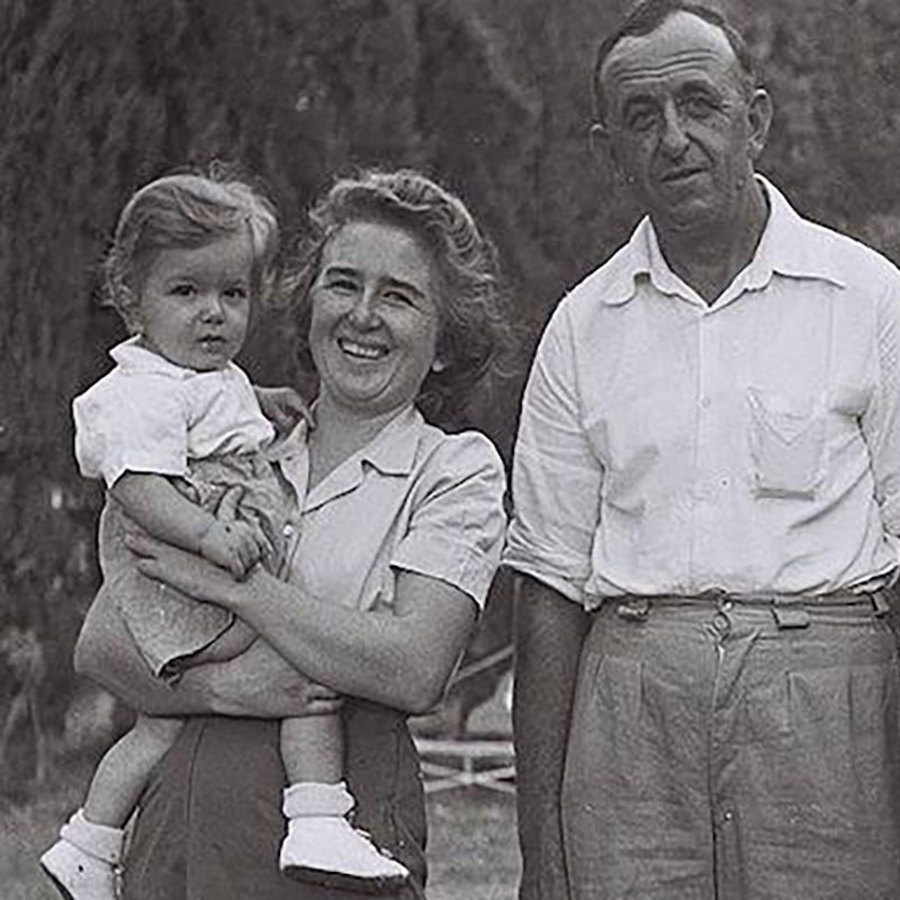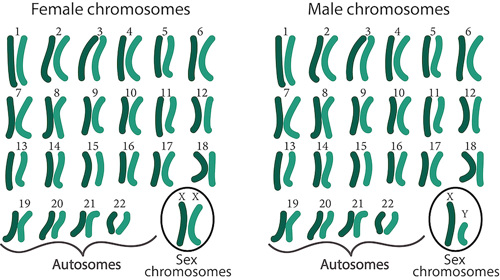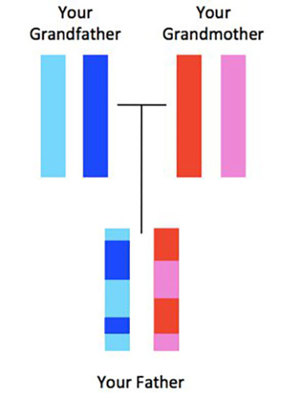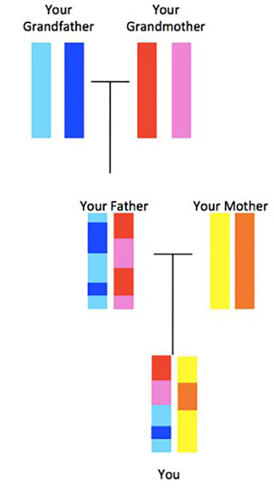
I’m female and don’t have a Y chromosome. Did I inherit any DNA from my paternal grandfather?
April 15, 2015

- Related Topics:
- Chromosomes,
- Y chromosome,
- Relatedness
An undergraduate student from Oklahoma asks:
“As a female, I am wondering how I am genetically related to my paternal grandfather. Since he gave my father a “Y” chromosome and I do not have one, is there other genetic information passed down in other forms?”
Yes, there is genetic information passed down in ways other than through a “Y” chromosome. In fact, the Y actually contributes only a small amount.
So you and your paternal grandpa do share genetic information. In fact, you share a whole lot. You share around 25% of your genetic information with each grandparent. There is more to genetics than just the Y.
For the rest of this answer, I will explain why this is the case. As you’ll see, it has to do with how something called chromosomes are passed down from parents to child.
Genetic Material is Packaged in Chromosomes
Our genetic material is contained in our DNA. Our DNA is like the instructions for our body. It tells us what to look like and who to be. It is why we are all unique!
Your body organizes this DNA into “worm-like” structures called chromosomes. These chromosomes are very important and help protect our DNA from any damage.
Most of us have 46 chromosomes in most of our cells. These 46 chromosomes come in 23 pairs with the first 22 being the same between boys and girls.
The last pair of chromosomes are called sex chromosomes. Most biological males have an X and Y chromosome, while most biological females have two X’s.

We Get One Chromosome from each Parent
As I mentioned, chromosomes come in pairs. For each pair, we get one chromosome from mom and the other from dad. That’s why we are half our dad and half our mom!
Our sex chromosomes are the same. We get one from our mom and one from our dad. Most girls have two X chromosomes and most boys have an X and a Y.
Because girls have two X chromosomes, this means moms can only pass on an X to their kids. Boys have an X and a Y and can pass on either the X or the Y. So, it is actually your dad who determined if you were a boy or a girl!
But remember, just because you don’t inherit a Y chromosome from your dad doesn’t mean you don’t inherit any other genetic information. There are 22 other chromosomes you get from him, plus his X.
All of this holds true for your dad’s dad as well. Even though you did not get his Y or any of his X, you still got a lot of DNA from him.
It Doesn’t Matter if You are Male or Female
As I keep saying, you get half of your chromosomes from your mom and half from your dad. This is why you share 50% of your DNA with each of your parents.
Your parents also inherited their chromosomes from their parents. This means that each of your parents is 50% related to their parents. It also explains why you are around 25% related to your grandfather – regardless of whether you identify as a male or female.
Your dad got 50% of his DNA from his dad. Here is what that looks like:


Now when your dad has you, he passes half of his DNA to you like this:


As you can see, you share around 25% of your DNA with your dad’s dad. Half of half is one quarter.
You may have noticed that I keep saying around or about. Click here for one reason why I don’t say exactly 25%.
The farther you are away from somebody in your family, the less genetic material you share. Just like you only share 25% of your genes with your grandparents, you share even less with your cousins and even less with your second or third cousins.
Now having said all of this, grandsons and granddaughters do, on average, share a bit less DNA with some of their grandparents. It does have to do with that X and Y chromosome, but we are talking tiny, insignificant differences that really aren’t that much DNA compared to the other 22 pairs. (Click here to read more about this.)
So we can pretty much say that the amount of genetic material you share with people in your family doesn’t depend on whether they or you identify as a male or female. Remember, there are 44 other chromosomes that contain genetic material.
What this all means is that even though your father got his Y chromosome from his father, he still got 22 other chromosomes from his dad. And it is possible that parts of some of those chromosomes got passed on to you.
This is why traits like height or hair color can still get passed down through grandparents to parents to children. You may share traits with your grandparents and not even know it!
Overall, it is important to remember that even if you and another family member are not the same gender, you still can share genetic material. In fact, a whole lot of it.

Author: Rebecca Luiten
When this answer was published in 2015, Rebecca was a student in the Stanford MS Program in Human Genetics and Genetic Counseling. She wrote this answer while participating in the Stanford at The Tech program.
 Skip Navigation
Skip Navigation
